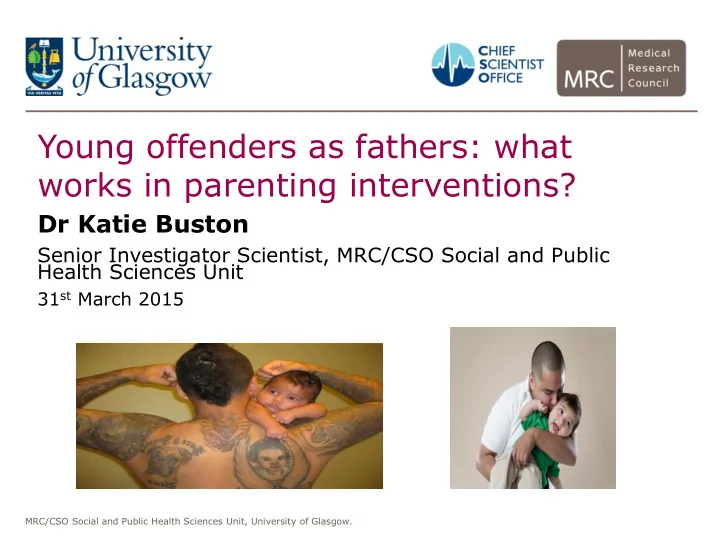

Young offenders as fathers: what works in parenting interventions? Dr Katie Buston Senior Investigator Scientist, MRC/CSO Social and Public Health Sciences Unit 31 st March 2015 MRC/CSO Social and Public Health Sciences Unit, University of Glasgow.
Overview • What research evidence is there for effective parenting interventions for incarcerated male young offenders who are fathers? • Current work with Barnardo’s and the Scottish Prison Service evaluating a parenting intervention within HMP YOI Polmont, ce Central Scotland: early results MRC/CSO Social and Public Health Sciences Unit, University of Glasgow.
Background • Up to 1 in 4 YOs actual/expectant fathers • Most desire to be ‘good fathers’ • Break the cycle of negative parenting practices • Prison is PRIME opportunity for intervention work: • Time • Drink/drug free • Motivation to learn/change MRC/CSO Social and Public Health Sciences Unit, University of Glasgow.
Evidence? SCRE • History of parenting interventions delivered to YOs in UK, but patchy/not sustained/little rigourous evaluation • Boys and staff like interventions • Probably short term knowledge gains and attitude change • Promising, but little clear evidence of nature of effectiveness MRC/CSO Social and Public Health Sciences Unit, University of Glasgow.
Way forward? • Evidence based approach would borrow ideas from parenting intervention lit generally, and limited evidence from intervention for older prisoners/work with younger fathers in community • BUT young offender fathers have specific developmental, rehabilitative and contextual needs • Young and incarcerated: doubly disadvantaged • Separation from child/partner; resettlement issues • Prison delivery: opportunities and limitations SO LEARN FROM OTHER EVIDENCE but need to be sensitive to particular needs of these young men MRC/CSO Social and Public Health Sciences Unit, University of Glasgow.
Barnardo’s Scotland: developing a parenting intervention for YOs - Parenting finally on SPS agenda = FUNDS! - 2014: Barnardo’s Scotland win SPS tender - Two SPS parenting officers appointed - Acknowledgement of best evidence based practice in similar areas: Parenting Matters in NI with adult father prisoners; Five to Thrive attachment based parenting work - Barnardo’s facilitator initially works with SPS officers to ensure intervention compliance and meet training needs; long term sustainability MRC/CSO Social and Public Health Sciences Unit, University of Glasgow.
Barnardo’s parenting intervention • 10 week course, one full day a week • Separate one to one work • Option to extend on completion with weekly half day drop ins • Delivered by experienced Barnardo’s facilitator and SPS parenting officer (PO), plus outside guests for specific topics • Approx 6-8 fathers • Discussion, DVDs, worksheets, arts & crafts, quizzes, skills work; games: • Informal atmosphere; supportive relationships with POs • Three special (and extra) bonding visits facilitated by POs; one to one feedback on interaction with child • End of programme ceremony attended by (ex)partner, child(ren), governor. Certificate, buffet! MRC/CSO Social and Public Health Sciences Unit, University of Glasgow.
How might it work: theory of change? • Content • Facts e.g. around passive smoking • Opportunities for reflection/discussion • Skills based work • Sharing with other boys in similar situations, present & past lives • Relationship with facilitators • No prison hierachies/laws of jungle here • kind & sensitive relationship • Nurturing ethos • Tea/coffee/biscuits in prison environment • Comfy bright room • ‘special’ e.g. certificate, visit from governor • Enhanced opportunities for contact with child/partner • Focused one to one work: including visit feedback MRC/CSO Social and Public Health Sciences Unit, University of Glasgow.
Formative evaluation: early thoughts/findings: dads Participation starts off Lots of patchy building to full expressions house; boys requesting to of repeat course/attend drop ins appreciation and gratitude to facilitators: esp re nurturing elements Boys generally very engaged in all elements, good reflection on previous weeks’ work MRC/CSO Social and Public Health Sciences Unit, University of Glasgow.
Formative evaluation, early thoughts/findings: facilitators Challenges of working in prison environment: attitudes of hall/ Some attitudes of other staff; inflexible rules/ boys difficult to routines constantly challenge: replicated by visitors on occasion Facilitator discomfort with some c rimes: “I am not having him on the course – n o way I’m teaching kiddie fiddlers to be better kiddie fiddlers” MRC/CSO Social and Public Health Sciences Unit, University of Glasgow.
Conclusion • Long way to go before we have established evidence on exactly WHAT works and HOW, especially in longer term • Ultimately need to see improved outcomes for children from baby-young adulthood and beyond • BUT boys like it, engage, recall and build as programme progresses, appear to reflect on own practices • Dedicated staff committed to developing programme – SPS and Barnardo’s • Commitment from SPS to sustainability; generally good fit with other institutional practices MRC/CSO Social and Public Health Sciences Unit, University of Glasgow.
Next steps Interview boys: • Likes/dislikes re programme • Processes leading to knowledge/attitude/behaviour change • Their own childhood and parenting practices and how programme encouraged them to reflect on that (or not) • Feedback into development of programme with Barnardo’s and SPS • More rigourous evaluation of ‘finalised’ programme MRC/CSO Social and Public Health Sciences Unit, University of Glasgow.
Thank You, any questions? MRC/CSO Social and Public Health Sciences Unit, University of Glasgow.
Recommend
More recommend